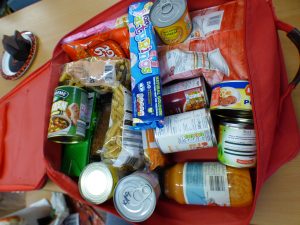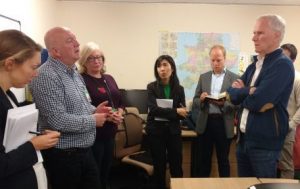What was it like to be a child during Nazi rule, and what have children said about their experiences? These are the central questions driving Dr Beate Müller’s impact and engagement project on ‘Children under the Nazis’. Continue reading
Category Archives: Think Pieces
“I was born poor, and I will die poor”: Reflections on disability, ill health and poverty in the age of Universal Credit

This Disability History Month, Silvie Fisch, director of Northern Cultural Projects and associate researcher with the Oral History Unit & Collective, shares some of the stories she heard during our Foodbank Histories project and reflects on the interconnections between disability, ill health and poverty in the age of Universal Credit.
Foodbank Histories meets the United Nations

When the United Nations Special Rapporteur for Extreme Poverty visited the Newcastle West End Foodbank in Wednesday, the Oral History Collective was invited along to share some of the research findings from our six-month Foodbank Histories project, a partnership with Northern Cultural Projects. This work is also part of the Being Human festival, 15-24 Nov. So why is it important?
Using imagination to connect with the recent and deep past
For many – maybe most – of us, imagination is what gets us interested in history in the first place. Recently, the oral history collective have been having a lot of conversations about the connections between oral history and creative practice, including creative interpretation of history. In this post, Alison Atkinson-Phillips takes us on a winding journey of reflection on oral history and imagination, and offers a round-up of some local examples.
Deindustrialisation, heritage and Memory: a New Network
In this Lug post, Andy Clark discusses a new network that he’s coordinating focused on deindustrialisation, heritage and memory. It aims to facilitate greater collaboration and discussion among academics, heritage groups, artists, and community historians interested in deindustrialisation and the memorialisation of manufacturing jobs and communities. Email andy.clark@newcastle.ac.uk to find out more, or to join the network’s mailing list.
Community Experiences of Serious Organised Crime in Scotland
In this Lug post, Andy Clark discusses his experience conducting research for the Scottish Government’s Cabinet Secretary for Justice. Along with a team of researchers, he contributed to, and co-authored, a major report focused on community experiences of Serious Organised Crime in Scotland. He reflects on utilising oral history methods to examine current experiences and problems in relation to organised crime, and contributing to a policy report.
In His Own Voice: Dr Julian Tudor Hart (9 March 1927- 1 July 2018)
In this blog post Graham Smith remembers the pioneering general practitioner Dr Julian Tudor Hart who died on the 1st of July. Graham interviewed him in June 1999.
Click HERE for a .mp3 audio extract from the interview and for a .pdf transcript of that extract: Tudor Hart in His Own Voice pt 1 extract 1
Digital humanities and oral history: Seminar series
The Oral History Collective’s Seminar Series brings scholars to Newcastle so we can learn about their work on a range of interesting project and topics. Primarily, though, the seminar series allows us to explore methodological questions. In June, Anisa Puri visits to talk about Australian Generations: Creating a Digital Oral History Project. It’s got Alison Atkinson-Phillips thinking about the relationship between oral history and digital humanities (and digital culture here at Newcastle).
Reflecting on ‘Voices from the Picket Line’: Vox Pops
You may have heard that some UK universities, including Newcastle, are involved in a pensions dispute (see https://www.chroniclelive.co.uk/news/north-east-news/newcastle-durham-university-strikes-begin-14323108 for just one of the Chronicle articles on this issue).
As oral historians, we are always interested in hearing people’s voices–literally as well as figuratively. We knew that the experience of 14 days of striking had been a significant one for many other those involved–we knew through our own informal conversations, through Twitter posts (see the #USSstrikes hashtag for some of this), and indeed through our own varied experiences. But when we decided, on Monday 12 March, that we would take our recording equipment the next day’s picket, we had no idea what was about to happen.
